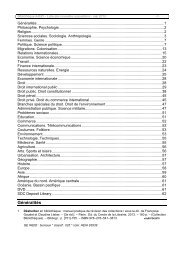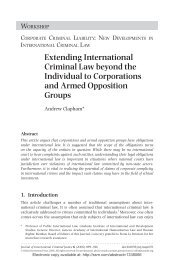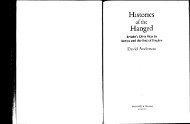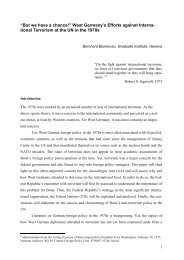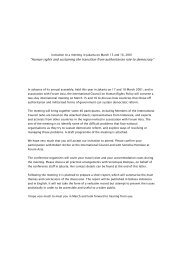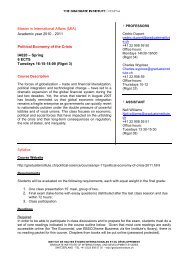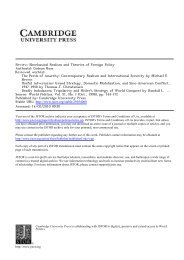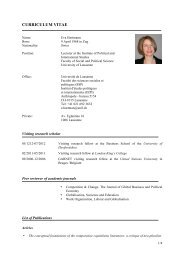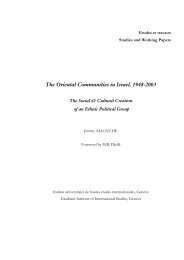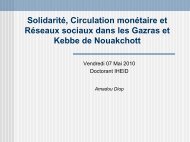Download - The Graduate Institute, Geneva
Download - The Graduate Institute, Geneva
Download - The Graduate Institute, Geneva
Create successful ePaper yourself
Turn your PDF publications into a flip-book with our unique Google optimized e-Paper software.
communitarian traits. Boyle and Chinkin suggest, for example, that soft law<br />
instruments "provide more immediate evidence of international support and<br />
consensus than a treaty whose impact is qualified by reservations and the need to<br />
wait for ratification and entry into force”. 114 But here there is certainly something<br />
missing: neither an international community can be created 115 , nor universal law<br />
produced by the simple fact of a (non-binding) declaration of programmatory<br />
nature. 116 As we have already said, soft law may represent precisely the contrary<br />
idea, that of disagreement.<br />
Moreover, if soft law instruments constitute a clear sign of<br />
communitarization and of the emergence of a juridically relevant international<br />
community, the effort to link the soft law phenomenon to an institutional framework<br />
leaves us perplexed. Why do we need an institutional framework that will work as a<br />
safety net to the process of soft-law creation? Why do we need a supervisory body or<br />
a forum for negotiation 117 when the so much cherished communitarian consensus<br />
naturally emerges from the drafting of soft law instruments? We believe that beyond<br />
the practical advantages of linking soft law instruments to a pre-established<br />
institutional forum, the insistence on an institutional framework for soft law cannot<br />
but signify the divergences in States’ views. As Professor Sztucki stresses, soft law<br />
might be the product of confrontation rather than cooperation. 118<br />
Once again, one can easily observe the inconsistencies of a communitarian<br />
reading of soft law. While soft law is associated with the ascendancy of the notion of<br />
the international community, this community discourse is compromised by the<br />
importance placed on the accompanying institutional mechanisms, as means for<br />
checking its evolution towards the “right” direction. But if soft law expresses a<br />
community consensus, why do we need a third party mechanism intervening and<br />
shaping what the community means by right direction? It is our submission that<br />
these inconsistencies are due to the fact that we push forward a notion of community<br />
that does not ensure the liberty for States and other actors to create their own<br />
114<br />
Boyle, Alan, Chinkin, Christine, op. cit., note ??, at 214. See also Fasternath, Ulrich, Relative Normativity in<br />
International Law, 4 EJIL (1993), pp. 305-340, at 339), who suggests that soft law « enables worldwide agreement<br />
on the content of hard law, in that it limits the scope of acceptable subjective auto-determination ». But surely<br />
there is no legal commitment to what has been declared – or maybe there is? See Shelton, Dinah, op. cit., note ??<br />
at 319, who argues that “nonbinding commitments may be entered into precisely to reflect the will of the<br />
international community...”.<br />
115<br />
Contra Allott, Philip, EUNOMIA: NEW WORLD ORDER FOR A NEW WORLD, 1990, Oxford, OUP, at 321 et seq.<br />
116<br />
See the much more careful language used by Abi-Saab, Georges, op. cit., note ??, at 60 and 65, who considers<br />
soft law « comme moyen de réalisation d'un projet de société partagé parmi ses sujets, un droit négocié et<br />
directif, voulu et agréé plutôt qu'imposé…[s]oft law énonce ainsi la conscience de la communauté<br />
internationale du bésoin d’une certaine réglementation juridique ».<br />
117<br />
See Shelton, Dinah, Normative Hierarchy, op. cit., note ??, at 319 et seq.; Dupuy, Pierre-Marie, op. cit., note ??,<br />
at 423.<br />
21


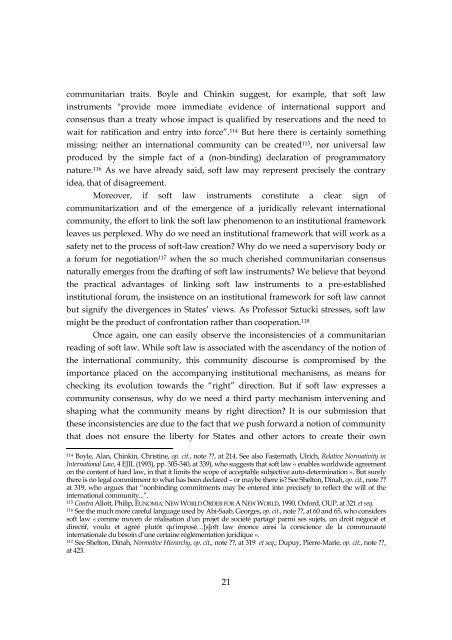
![Download [pdf] - The Graduate Institute, Geneva](https://img.yumpu.com/23370020/1/190x248/download-pdf-the-graduate-institute-geneva.jpg?quality=85)
